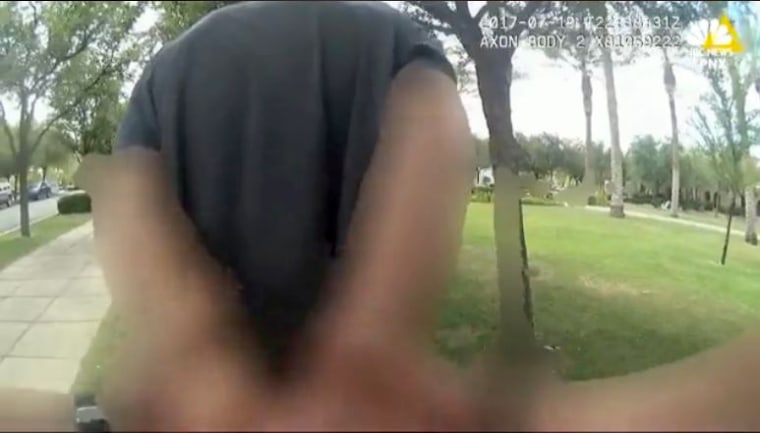An Arizona family is demanding an apology and more police training after their autistic 14-year-old son was held on the ground by an officer who mistakenly believed the teen was using drugs.
"This is as clear an example of inadequate training and supervision as you'll ever see," the family of Connor Leibel said in a statement to NBC affiliate KPNX of Phoenix.
The Buckeye Police Department on Monday released body camera footage of the July 19 incident, in which a police officer saw a teenager alone in a park "moving his hand to his face in a manner consistent with inhaling."
The video shows the teen telling the officer he's "stimming" — for self-stimulation — which is a type of behavior described as calming, and beginning to walk away before the officer roughly detains him.
The boy panics and repeatedly says "I'm OK" and screams before a caretaker shows up and tells the officer that he is autistic.
The caretaker explains that the boy was "stimming" and the officer says, "I don't know what that is."
Police said the boy was held on the ground for around two minutes and released.
Buckeye is a city of around 64,000 west of Phoenix.
The Buckeye police department said in a statement that it "trains our officers for a variety of scenarios, including interacting with those identified with disabilities."
They added that department officials are in the process of implementing "a voluntary registry of persons who suffer mental health crises in an effort to better respond and care for those in the community."
An attorney for the boy’s family, Timothy A. Scott, said in a letter to the Buckeye police chief that they disagree with the police finding that the officer did nothing wrong, and "this officer appears to have had literally no training in distinguishing between suspected drug users and citizens who suffer from developmental disabilities like autism."
The family has threatened a lawsuit, and wants an apology from the officer and "a mandatory training program that gives its officers the tools necessary to help distinguish between autistic and other developmentally-disabled people, and common drug abusers."
About 1 in 68 school-age children in the United Stateshas been identified with an autism spectrum disorder, the Centers for Disease Control and Prevention has said, based on data from 2012. An official with the agency said in 2014 that amounts to around 1.2 million children under the age of 18.
From 2014: Autism Diagnoses Surge by 30 Percent in Kids, CDC Reports
Cynthia Macluskie, vice president of the Autism Society of Greater Phoenix, which has organized 24 “Be Safe” events over the last 12 months that bring together families of those with autism and law enforcement. The program was started after a person with Asperger's syndrome was shot and killed by police in Mesa in 2016.
Macluskie suggests those with autism have a bracelet similar to a medical alert bracelet that identifies them. Those with autism can be slower to respond to commands from police, she said.
"Law enforcement needs training, but so do our families," Macluskie said. "We need to work together as a community to keep everyone safe."

